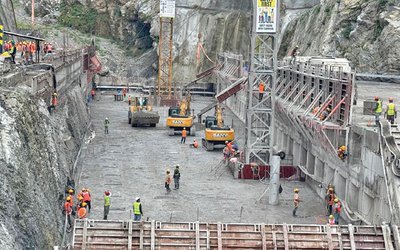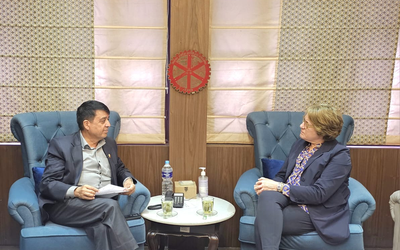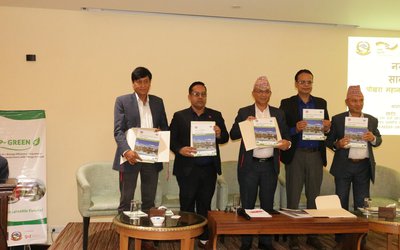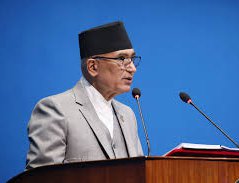
Some view the upcoming Fiscal Year 2025/26 budget as a traditional practice, while others see it as a practical and transformative measure. Deputy Prime Minister and Finance Minister Bishnu Prasad Paudel describes the new budget as a 'realistic' plan for the next Fiscal Year 2025/26.
Facing significant financial constraints, DPM Paudel has a challenging task ahead to implement the budget of Rs. 1,964.11 billion for the upcoming fiscal year.

Key Announcements
In a sluggish economy, Finance Minister Paudel presented a NPR 1.964 trillion budget for the upcoming fiscal year to the joint session of both Houses of the Federal Parliament. This budget is for the fiscal year 2082/83 (starting July 16, 2025).
The original budget for the current fiscal year was NPR 1.8603 trillion, but it was revised down to NPR 1.692 trillion during the mid-term review.
As in previous years, a significant portion of the budget is allocated for recurrent expenditures such as salaries and allowances.
In compliance with Article 119, Clause 1 of the Constitution, the Finance Minister presented the annual revenue and expenditure estimates from the federal consolidated fund, along with allocations as per the Federal Appropriation Act, in a joint parliamentary session.
During the Economic Survey presentation, Paudel forecasted Nepal’s economic growth rate for the current fiscal year (2081/82) to be 4.61%.
Estimated Sources and Expenditures
Out of the total budget of NPR 1.964 trillion for the fiscal year 2082/83 (2025/26), NPR 407 billion (20.8%) is allocated for capital expenditure (development spending), while NPR 1.180 trillion (60.1%) is allocated for recurrent expenditure. Additionally, NPR 357 billion (19.1%) is allocated for financial management, including debt repayment.
This budget represents a 5.6% increase from the current fiscal year and an 18.2% increase from the revised estimate. Furthermore, NPR 417.83 billion is allocated for fiscal transfers to provinces and local levels.
To finance these expenditures, Finance Minister Paudel aims to collect NPR 1.315 trillion in revenue and receive NPR 53.45 billion in foreign grants.
To cover the remaining deficit of NPR 595.66 billion, the Minister plans to raise approximately NPR 233 billion from foreign loans and NPR 362 billion from domestic loans.
Finance Minister's Commitments for Economic Recovery
The Finance Minister has outlined several commitments to drive economic recovery, including:
- Removing Nepal from the FATF grey list by monitoring money laundering risks.
- Utilizing credit rating results to attract foreign capital and implement economic reform programs.
- Encouraging private sector investment and technology adoption to enhance economic sectors.
- Implementing recommendations from the High-Level Economic Reform Suggestion Commission.
- Prioritizing employment promotion programs targeted at youth.
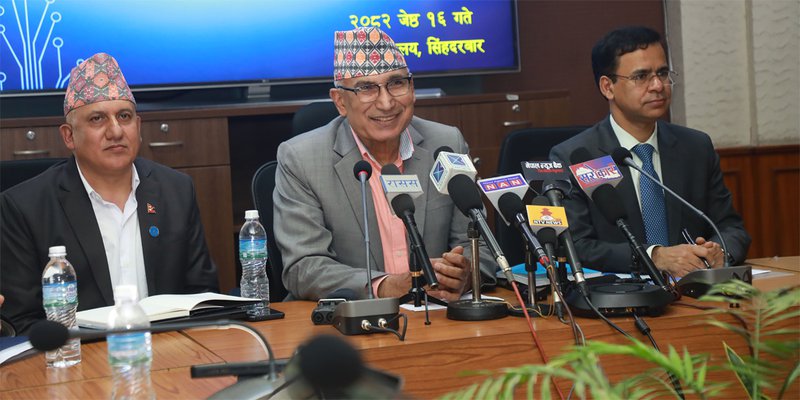
Economic Growth Projections
Finance Minister Paudel has projected a 6% economic growth rate for the upcoming fiscal year. He informed Parliament that the current fiscal year's growth is estimated to be 4.61%, with last year's growth at 3.7%.
The Economic Survey indicates that all provinces, except Madhesh, Koshi, and Sudurpashchim, have economic growth rates above the national average.
Nepal's economy is expected to reach NPR 6.107 trillion in size this fiscal year. The Finance Minister stated during the budget presentation that all economic sectors are expected to demonstrate positive growth this year.
Economic Growth by Sector
In the previous fiscal year, sectors like industry, construction, and wholesale and retail trade experienced negative growth. However, Finance Minister Paudel anticipates positive growth across all sectors in the current fiscal year.
He highlighted that sectors such as electricity, transportation and storage, and financial and insurance services are expected to experience significant growth. The economic growth in fiscal year 2078/79 (2021/22) was negative due to the impact of the COVID-19 pandemic.
Budget Allocations by Ministry
The Ministry of Education has received the highest budget allocation from Finance Minister Paudel. Here are the budget allocations for different ministries:
- Ministry of Education – NPR 211 billion
- Ministry of Home Affairs – NPR 208 billion
- Ministry of Physical Infrastructure and Planning – NPR 152 billion
- Ministry of Urban Development – NPR 118 billion
- Ministry of Health and Population – NPR 95.81 billion
- Ministry of Culture, Tourism, and Civil Aviation – NPR 13.58 billion
- Ministry of Forests and Environment – NPR 18.61 billion
- Ministry of Information and Communication Technology – NPR 7.72 billion
- Ministry of Youth and Sports – NPR 6.08 billion
- Ministry of Women, Children, and Senior Citizens – NPR 2.08 billion
- Ministry of Energy, Water Resources, and Irrigation – NPR 86 billion
- Ministry of Agriculture and Livestock Development – NPR 57.47 billion
- Ministry of Defense – NPR 62.01 billion
- Ministry of Finance – NPR 49.90 billion
- Ministry of Water Supply and Sanitation – NPR 33.89 billion
Addressing Teachers’ Demands
Finance Minister Paudel has allocated NPR 10 billion to continue the national health insurance program. The budget also includes a plan to settle all outstanding insurance claim payments within the current fiscal year.
To fulfill agreements with government school teachers, the budget raises the federal government’s grant to early childhood development assistant teachers.

A total of NPR 10.16 billion has been set aside as conditional grants for early childhood development teachers.
Populist Budget
Balancing the sources of income and expenditures has been a challenge for the Finance Minister amidst the increasing development aspirations and financing needs of the three-tier federal government structure.
In recent years, there has been a trend of announcing a large budget with populist programs and then revising the estimates during the mid-term review in February each year.
Health Insurance and Broader Social Support Programs are two major populist programs that consume a significant amount of the country's scarce resources.
In addition to the Health Insurance Fund, the government allocates around NPR 17 billion annually for healthcare, including NPR 6 billion for treating patients with severe illnesses and NPR 3 billion for the Safe Motherhood Program, as reported by the Health Minister.
To establish a sustainable national health insurance program, the Health Minister has proposed introducing progressive premium rates and consolidating various health security programs, including the health tax fund, under the health insurance scheme.
Old-Age Allowance and Social Security
Currently, individuals aged 68 years and older receive a monthly allowance of NPR 4,000. The government's expenditure on social security programs exceeds NPR 100 billion per year.
Despite raising the age for social security eligibility, expanding social security expenditure remains a concern.
Budget Cut
For instance, the government reduced the budget for FY 2024/25 to Rs. 1,692 billion from Rs. 1,860 billion – representing 90.99 percent of the total estimates – citing poor capital expenditure, insufficient revenue collection, and realization of foreign loans and grants.
Last year, in 2023/24, the budget was cut by 12.62 percent, bringing the budget size down to Rs. 1,530 billion from Rs. 1,751 billion. The modest capital budget of Rs. 352.35 billion was decreased to Rs. 299.50 billion.
DPM Paudel mentioned that the upcoming year's budget aims to address various development challenges such as fund dispersion. The government has proposed several policy reforms to boost economic growth by balancing public expenditure and development activities for the next fiscal year, according to him.
Pro-private sector budget
DPM Paudel stated that the budget is designed to incentivize private sector investment.
The government has addressed nearly all the demands put forth by the private sector through the budget. The budget includes various discounts and concessions for industries, including export-oriented industries, information technology-based industries, hotels, and resorts. The government has announced tariff exemptions for information technology-based industries, hotels, and resorts.
Likewise, a provision for a 75 percent tax exemption on income from exporting information technology services has been introduced. There is also an exemption from income taxes for startup businesses with an annual turnover of up to Rs. 100 million for five years.
The government has eliminated other taxes and duties by imposing only a 1 percent customs duty on the import of mill machinery needed for the wood seasoning industry, removed customs duties, and abolished other taxes and duties on the import of equipment required for the production of organic and natural fertilizers.
Similarly, the proposal for policy reforms to promote foreign investment aims to create an environment conducive to attracting foreign capital into the economy. Deputy Prime Minister Paudel emphasized that these initiatives are geared towards promoting good governance, transparency, and sustainable development.
The New Budget and Its Impact
According to Nepal's Constitution, taxes cannot be imposed or collected without the enactment of a law. Therefore, adjustments to direct taxes such as income tax and indirect taxes like VAT are made through the budget presented in Parliament.
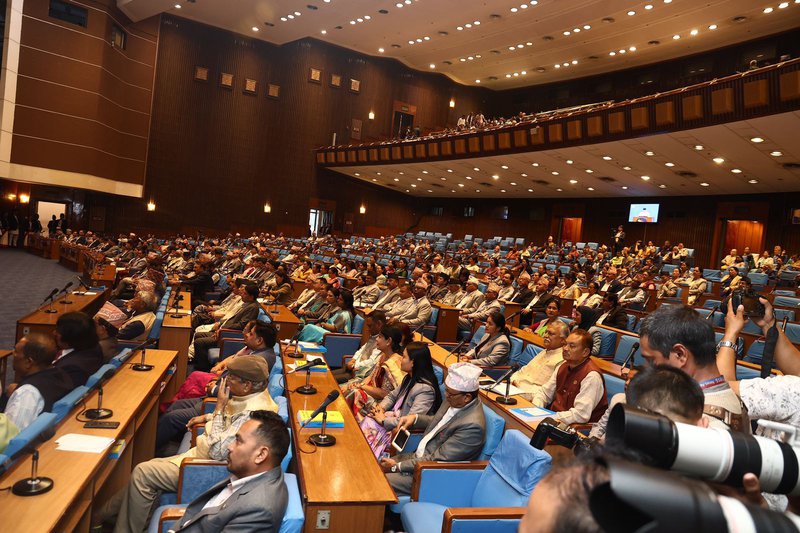
Changes in income tax rates, value-added tax (VAT), various fees, excise duties, and customs duties have immediate effects on the population. Income tax rates and exemption limits, especially for individuals with regular incomes, receive the most attention.
Currently,individuals earning up to NPR 500,000 annually and couples earning up to NPR 600,000 pay a 1% tax rate. For couples, income between NPR 600,000 and 800,000 is taxed at 10%, between NPR 800,000 and 1.1 million at 20%, and between NPR 1.1 million and 2 million at 30%.
Former Revenue Secretary Ram Sharan Pudasaini stated, "A budget impacts everyone in some way. Its spending programs may provide relief for the general public, its tax policies affect businesses, and it garners interest regarding salary matters for employees and price increases for homemakers."
Given the economic slowdown and decreased consumer demand over the past two years, major private-sector organizations like the Federation of Nepalese Chambers of Commerce and Industry (FNCCI) and the Confederation of Nepalese Industries (CNI) have urged the government to raise the income tax exemption limit in the upcoming budget.
Ambika Prasad Paudel, Chair of FNCCI's Tax and Revenue Committee, highlighted that the current top tax rate of 39% is among the highest in the region and should be reduced.
The CNI suggested that increasing the exemption limit and capping the maximum personal income tax rate at 30% would "enhance disposable income and stimulate overall demand."
Economists have recommended that the government focus on broadening the tax base rather than solely adjusting rates and ensure that tax rates remain reasonable.
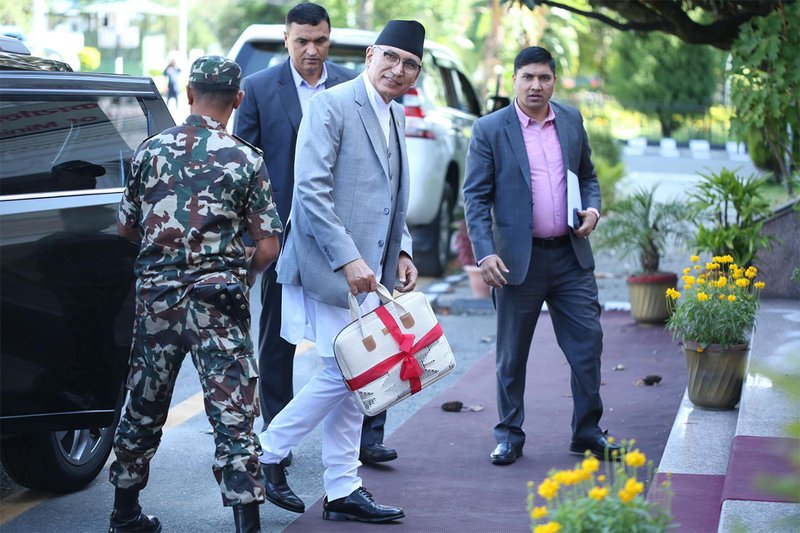
Development Spending and Infrastructure
Government development spending and infrastructure projects are closely monitored by the general public. However, reports suggest that Nepal has made limited progress in this area.
The Office of the Comptroller General reported that only 36% of the capital budget has been utilized with just a month and a half remaining in the current fiscal year. Out of the allocated NPR 352 billion, only NPR 129 billion had been spent by mid-Jestha (end of May).
Since Bikram Sambat 2068 (2011 AD), more than two dozen projects have been designated as "national pride projects." However, a recent report by the Auditor General revealed that only two of these projects have been completed so far. The physical progress on most projects is reportedly very poor.
Economists argue that increased development spending can lead to more job opportunities and long-term economic growth. Therefore, the emphasis on development spending in this year's budget is crucial.
Reforms in Project Management
The government has introduced measures to diversify resource mobilization through alternative development finance in the budget. This is expected to enhance financial access for long-term infrastructure development.
Efforts are being made to improve project management and procurement processes to boost capital expenditure. A threshold of Rs. 30 million has been set for federal projects in the budget, and grants will be limited to a maximum of 50% of the cost to enhance cost control and planning efficiency.
Deputy Prime Minister Paudel also announced plans to amend the Public Procurement Act and implement an electronic procurement system to ensure timely, cost-effective, and quality completion of infrastructure projects.
Prices of Basic Goods and Inflation
The most recent report from Nepal Rastra Bank indicates that inflation, as measured by the Consumer Price Index (CPI), is at 3.39%.
This data suggests that inflation is currently in line with the government's expectations.
Experts warn that changes in upcoming expenditure and revenue policies outlined in the new budget could lead to fluctuations in inflation rates. For instance, two years ago, following the budget announcement, prices of potatoes and onions surged, reportedly doubling or tripling after it was revealed that VAT would be imposed on these items.
In addition to goods, alterations in service taxes introduced or eliminated in the budget directly impact consumers. Previous budgets have introduced measures like a 5% service charge on Nepalis traveling abroad and luxury taxes. It is anticipated that this year's budget will also contain adjustments that will affect consumer spending. Deputy Prime Minister Paudel has expressed confidence that the upcoming fiscal budget, with its policy reforms and increased support for the private sector, including concessional loans and reduced customs duties, will have a positive impact on the economy.
- EU’S ERASMUS MUNDUS: Scholarship For Quality Education
- Aug 05, 2025
- ADB: Partnership For Growth
- Aug 04, 2025
- HCC-N: Economic Ambassador
- Aug 03, 2025
- MONETARY POLICY: Disappointing Outcome
- Jul 17, 2025
- MELAMCHI WATER SUPPLY: No Interruption During Monsoon
- Jun 25, 2025
